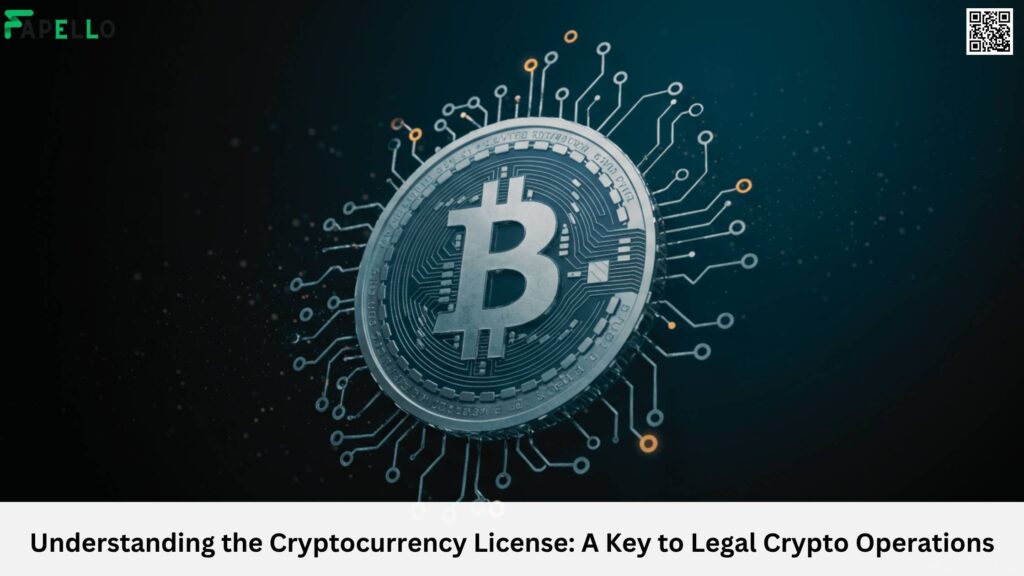As digital assets continue to reshape the global financial landscape, the demand for regulatory clarity in the crypto sector is stronger than ever. Entrepreneurs looking to launch cryptocurrency exchanges, wallets, or related services must understand the significance of obtaining a cryptocurrency license. This critical credential not only ensures legal compliance but also builds credibility among users and investors.

In this article, the focus is on what a cryptocurrency license is, why it is essential, and how businesses can navigate the licensing process effectively.
What Is a Cryptocurrency License?
A cryptocurrency license is what government and financial institutions issue to companies, which in turn allows them to be a part of the digital asset market. This includes the trade of crypto for fiat, issuing tokens, and running a crypto wallet service or a crypto exchange platform.
To see that crypto businesses are in compliance with AML, CTF, and consumer protection laws.
Why Is a Cryptocurrency License Necessary?
Operating outside of proper authorization may see a company that is found out to have broken rank in the law, which in turn may present the issue of legal penalties; also, it may also bring into question the company’s reputation and, in some cases, cause the business to shut down. Also, companies that do get a cryptocurrency license have the opposite experience.
- Legal Clarity: Under a license, the business is in the open and abides by set regulatory rules.
- Customer Trust: Companies that are licensed present themselves as more credible to customers and investors.
- Banking and Payment Solutions: Many financial institutions choose to do business with licensed crypto companies, which in turn improve access to banking.
- Global Expansion: In one recognized jurisdiction, a license may serve as a ticket into others.
Jurisdictions Popular for Cryptocurrency Licensing
Some countries have come to be the primary markets for crypto license issues thanks to their clear regulatory structures and environment, which is very business-friendly. As for which ones are very popular:
- Estonia
Estonia was one of the first countries to embrace crypto regulation. Its license covers two activities: virtual currency exchange and virtual wallet services. However, recent reforms have made compliance stricter to align with EU directives. - Lithuania
Lithuania has become a key licensing hub in the EU. The process is very fast, and once MiCA is fully implemented, companies will have access to the EU market. - Switzerland
Switzerland is a pioneer in the digital assets ’space, which is putting into many different licenses, including FinTech and full banking licenses, which in turn depend on the type of crypto business. - Dubai (UAE)
This is not an exact location, like Dubai. It does not refer to a specific city in the request but rather to the capital in the UAE that has the same initials. It includes the primary UAE’s capital. If that was what was required, please confirm.
Dubai’s Virtual Assets Regulatory Authority (VARA) issues licenses to crypto firms. It is at the forefront, which is attracting both start-ups and global crypto players.
Each jurisdiction has its own set of rules, which is why professional help is very beneficial. For those who wish to begin the application process, there is a detailed guide on Fintecharbor’s crypto license page that goes into what is required and how to get started.
Core Steps in Obtaining a Cryptocurrency License
In each country, the process is different, but for the most part, what it does is go through a series of key steps:
- Company Registration
Applicants should first set up a legal business entity in the jurisdiction, which includes choice of business structure, appointment of directors, and preparation of basic founding documents. - Document Submission
Applicants must include a business plan, AML/CTF policies, stakeholders’s identification documents, and proof of address. - AML/KYC Compliance
Authorities will look at the strength of the AML and KYC programs. Also, it is necessary that a qualified compliance officer be appointed. - Fit and Proper Test
Regulatory agencies may perform background checks on directors and shareholders, which may reveal a criminal past or financial misdeeds. - Application Review
Once a submission is made, the licensing board will review it, which at times will take from a few weeks to a few months, depending on the district. Some may require interviews and extra documentation.
Challenges and Considerations
Securing a crypto license is an issue that many have trouble with. Regulation is a complex issue, and there are many cases of approval delay or rejection when the required criteria are not met. Also, as the industry grows, the regulatory environment it operates in also develops.
Applicants must also consider:
- Ongoing Compliance Costs: Licensed companies must report on a regular basis, conduct audits, and update AML policies.
- Changing Regulations: Keeping up with changes in laws and global standards is a must for compliance.
- Cross-Border Operations: Running a crypto business of global scale may require multiple licenses or passporting rights in certain regulatory environments.
For companies operating in this complex environment, professional help can reduce risk and cost. Fintecharbor has a tailored approach to legal and compliance support that is put in place for smooth and efficient licensing. It ensures efficiency, especially in highly regulated markets.
The Future of Crypto Licensing
As of now, there is a trend of governments putting in place frameworks for digital assets in traditional finance, which is a growth area. The European Union’s MiCA (Markets in Crypto Assets) regulation is a case in point, introduced to have uniform crypto rules across all member states by 2026. The result will be a more predictable licensing environment, which also raises the bar for applicants.
Additionally, many countries in Asia, the Middle East, and the Americas are rolling out specific policies to bring in what are termed as legitimate crypto businesses while putting out rules against fraud and money laundering. Those that have proper licenses and follow the rules will be at an advantage in this changing global landscape.
Conclusion
In the digital asset space, a crypto license is a must for companies that want to do well. It is a mark of a company’s commitment to transparency, security, and regulatory compliance. As regulation in crypto tightens around the world, early compliance is not only protective for a business but also the key to accessing new markets and investors.
To learn more in depth about the license process or to get professional support that is specific to any business, it is recommended to use the Fintecharbor cryptocurrency license resource—the first step in putting together a secure and credible crypto business.






